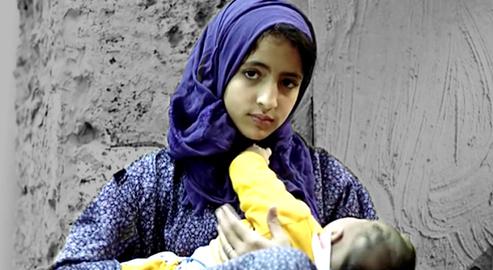Tahereh was not even 10 years old when her parents brought her a ring and a wedding shawl and started the pre-marriage arrangements for a traditional wedding ceremony. “The moment my mother learned that I had had my period, she and my father had a whispered conversation," says Tahereh. "And a couple of days later my aunt’s family came with a ring and told me that now I was an adult and I was going to be my aunt’s daughter-in-law.”
Tahereh is now 22 and has three children with her husband, her cousin Rahman. “Nobody asked me about my opinion or anything,” she remembers. “They had made their own arrangements. The fact is that I could not understand what was going on. I was more preoccupied with wearing a bridal gown and things like that and had no idea what was exactly going to take place.”
Tahereh and her young family live in the northwestern province of Ardabil. “In our village, in those times, that was the age when they married off girls,” says Tahereh’s mother. “People said that when a girl reaches puberty she would learn too much about the world if she stays home for too long.”
Tahereh’s marriage to her cousin Rahman was arranged the moment that she was born. Her aunt suggested it and her father consented. Tahereh’s mother was only 23 herself when she became a mother-in-law. “I was married to my cousin when I was nine,” she says. “I didn’t know any better. But my younger daughters Sanam and Fatemeh married when they were 13.”
Tahereh’s mother believes that 13 is a proper age for girls to marry. “By then, the girls have reached puberty and they know enough to manage the household,” she says. “The sooner they marry and get to have children and grandchildren the better. What is the use if they wait for another 10 years?”
In their village, girls between the ages of 10 and 15 don wedding gowns and marry young men between 18 and 22.
But although this is common practice in this village in Ardabil, it also happens across Iran — and not only in rural communities. “Some believe that these marriages happen only in villages,” the social worker Z. Mousavi told IranWire. “But we see child marriages in the outlying areas of big cities and even among traditional families in big cities.”
She says that child marriages in Iran are actually on the increase, even though “the average age of marriage in the country has gone up.” Families are worried that if they wait too long, their daughters won’t be eligible for marriage.“Some families are afraid that their children will become more choosy the older they get and end up unmarried. For example, I know a family whose 33-year-old daughter has not married and this has worried them sick. They married off their 15-year-old youngest daughter to save her from the fate of her older sister.”
In 2016, Shahla Ezazi, a professor of sociology at Allameh Tabatabai University and the Director of Women's Studies Group, also warned [Persian link] that child marriages were on the rise. “Compared to last year, there were 10,000 more child marriages in Iran,” she told a seminar. “As a result, the rate of divorce among 10- to 18-year olds has also picked up.”
A “Calamity”
“The marriage of 37,000 girls younger than 13 in Iran is a calamity,” tweeted Nahid Khoda-Karami, a female member of Tehran City Council and a member of the faculty of Shahid Beheshti University of Medical Sciences [Persian link]. “Of this number, 179 girls were under 10.” International law considers forced marriage a type of slavery and forbids it. But Iran does not forbid child marriage.
In Iran, girls can legally marry at 13, and boys at 15. But the law also states that if a girl’s father finds that it serves his daughter’s interests he can arrange for her to marry before she reaches the age of 13. As a result, Iran effectively has no minimum age for marriage.
Tahereh’s marriage was registered when she was 11 years old following a court order. “We went to the office to register the marriage,” she says. “The registrar said the bride was under 13. They tried to convince him but he would not concede, and so they wrote a letter to the court.”
She remembers her day at court well. “The judge asked me nothing,” says Tahereh. “He only asked my father if I had reached puberty. When my father said ‘yes’ he allowed the marriage to be registered.”
Tahereh’s mother, however, has a different take. “No parent wishes her or his child ill,” she said. “When the judge sees for himself that the parents are sane and hardworking he recognizes that they have made the right decision.”
Who Decides the Child’s “Best Interests”?
But how does the court decide what is in the best interests of children? “The law lacks any criteria for defining the best interests of the child and for authorizing underage marriage,” the lawyer Musa Barzin Khalifehloo told IranWire. “It is up to the father or grandfather to show the court that the marriage is in her best interest and the court must approve. Some judges believe that the child is unable to decide what is in her best interest, so they do not ask the child about it. But legally this is wrong. It is absolutely necessary for the child to consent and she must be questioned about it.”
According to Article 1041 of the Iranian Civil Code [PDF], marriage before “the age of maturity” is prohibited. But the code also contains a proviso that states: “Marriage before puberty by the permission of the Guardian and on condition of taking into consideration the ward’s interest is proper.”
Last year, Fatemeh Zolghadr, a reformist member of the parliament from Tehran, reported that the reform of Article 1041 was underway. The proposed amendments to the bill would impose a ban on the marriage of girls under 18 and are due to be tabled in parliament once religious authorities give their permission, she said.
But there are staunch opponents to the proposed reform, even among women.
Fereshteh Roohafza of the Women's Cultural and Social Council, a subdivision of the High Council of Cultural Revolution, who holds a Ph.D. in electronics from the University of Manchester, is one such opponent. “One can see the fingerprints of a feminist and western worldview” on the plan to amend the law, she told Mizan, the organ of Iran's judiciary. “If these members of the parliament want to prevent possible risks due to marriage at 13, then it would be better for them to say why they do not prevent inevitable risks to women who have not been able to marry at more advanced ages.”
She added that reforms would also “create discord between fathers and daughters if other people believe that they have the right to interfere.”
Changing the Law Is Not Enough
According to the social worker Z. Mousavi, changing the law will not prevent child marriages alone. She says many child marriages are not registered until the girl reaches the legal age. “Traditional families are more mindful of religious aspects of the marriage,” she says. “As long as the religious ceremony is done, they do not care if it’s registered or not. The marriage is registered after the girl reaches the legal age and by then the court and the judge’s permission become irrelevant.”
Because of this tendency to avoid registering marriages among some parts of the population, there are no accurate statistics for child marriage in Iran. But the National Organization for Civil Registration (NOCR) and other government agencies do publish official figures, albeit infrequently, and they confirm that child marriage is on the rise.
In 2012, the NOCR announced that in that year 1,537 girls under 10 and 29,872 girls between the ages of 10 and 12 had entered into a marriage. However, statistics published in 2013 were more shocking. The organization announced that, in just nine months, marriages involving more than 31,000 girls under the age of 15 girls had been registered. The most recent figures put the number at 37,000.
In 2013, in a short study entitled “Stolen Lives, Empty Classrooms” [PDF], the non-profit human rights organization Justice for Iran analyzed the 2012 statistics on child marriages by province. The analysis showed that, compared to other provinces, marriages of girls under 10 years of age is much more widespread in Ardabil. “At 1,411 cases,” says the study, “Ardabil...has the highest number of marriages for girls below the age of 10; a number 67 times more than the next highest province. The daily average of girl marriages in Ardabil is four, which directly implies that in this particular city, judges routinely allow legal guardians to force their girls into marriage.”
Poverty, Religion, Tradition
The majority of Ardabil's population are ethnic Turks. “Maybe it is the Turks’ extravagant sense of honor that makes them marry off their girls as soon as possible,” says Tahereh. But Mousavi says the main contributors to child marriage are poverty, religious beliefs and traditions. “Some religious and traditional families believe that girls must marry before they get tainted by sin, so they usually marry off the girls between 13 and 18,” she said. “Some do this because of poverty, so they will not have another mouth to feed. Many of the marriages under age 10 are because of this. Of course there is still the tradition of arranging marriages immediately after birth in some villages, but it is less common now.”
Until she went to her husband’s home, Tahereh knew nothing about conjugal life. “For a whole week I escaped my husband,” she says. “My mother said that I had disgraced the family. But nobody had told me anything and I was really scared.”
Tahereh is not unhappy with her life, but she admits: “I feel jealous when I see children of 10 or 11 who are going to school and have a lot of toys and no responsibility.”
Now Tahereh has two daughters, aged seven and five, and a son, who is a few months old. “I will let them marry whenever they want,” she says. “They must go to school first. But they should not wait too long to marry. As my mother says, all mothers wish to see their daughters in her wedding dress.”
visit the accountability section
In this section of Iran Wire, you can contact the officials and launch your campaign for various problems

























comments